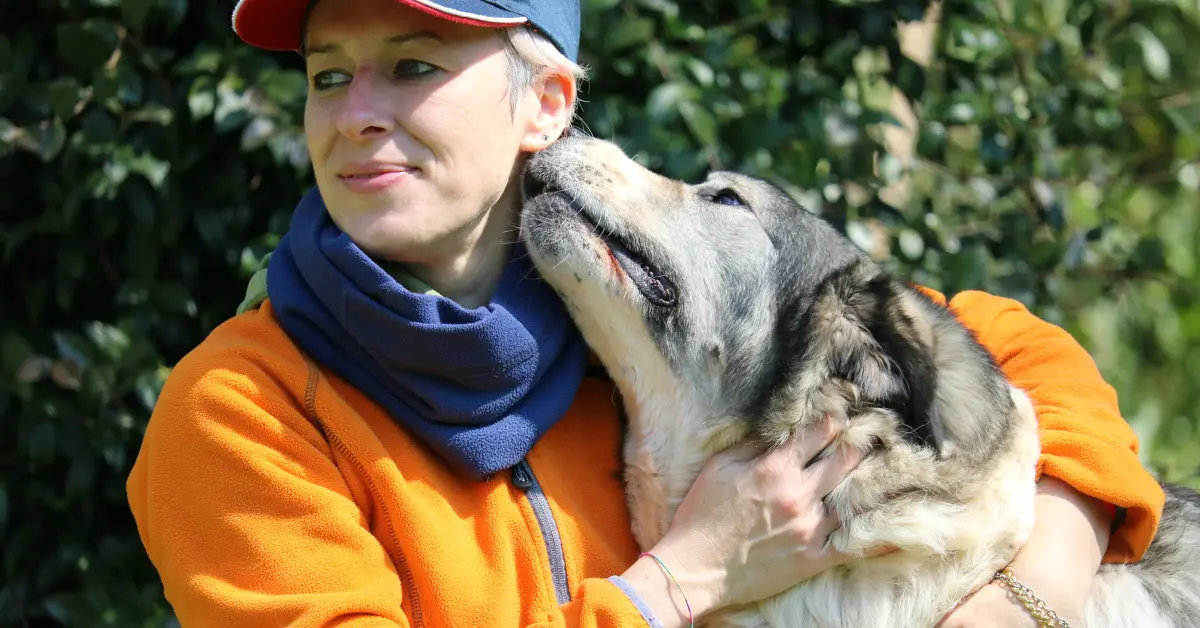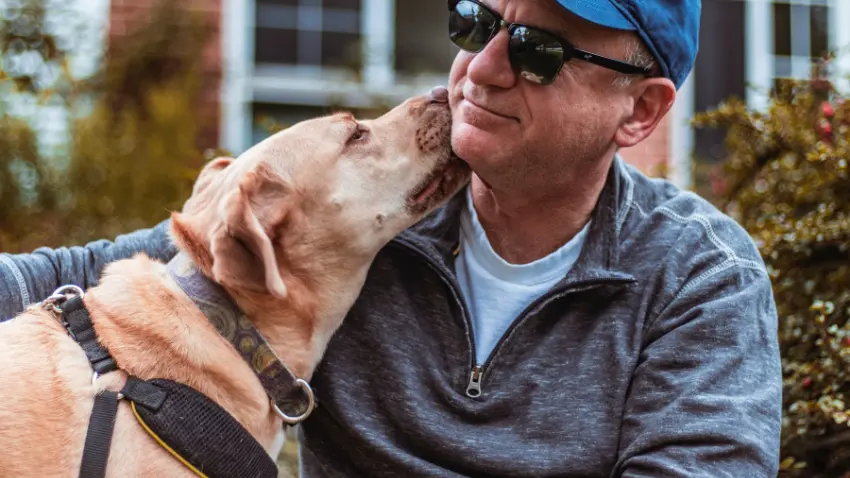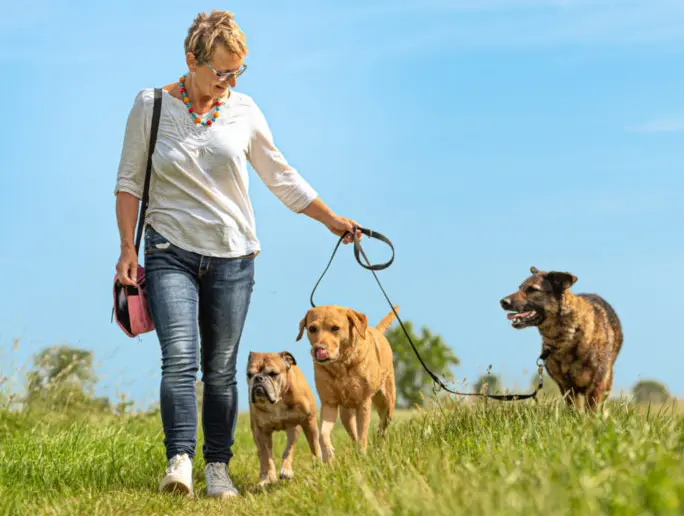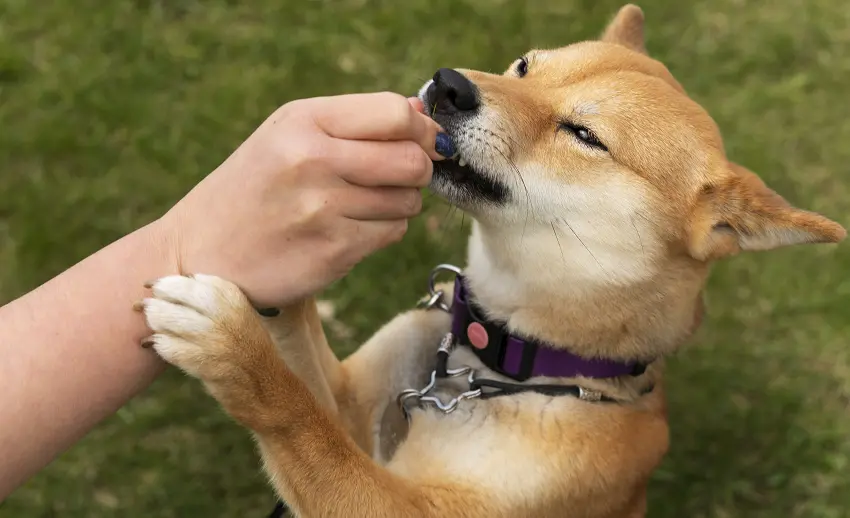Why Does My Dog Nibble My Ear? Here’s the Explanation
Dogs love mouthing everything that comes their way. It’s how they explore objects that they find interesting. But why does my dog nibble my ear? If you have a pup, teething is probably to blame. This phase is uncomfortable for your dog and nibbling is the easiest way to appease their sore gums. It could also be a canine’s primal instinct of licking their pack members. Aside from that, there are other possible reasons that I discussed below:
Why Does My Dog Nibble My Ear?
My dog Sherlock has a lot of weird behaviors. Lately, he started to nibble our ears for unknown reasons. He does so religiously that anyone who will sit on the couch will get an ear licking. After a quick phone call with the vet, we were told that the following could be the reasons:


1. Teething
Puppies that are in their first six months of life would be experiencing teething twice. Puppies will get their milk teeth at around three to six weeks. Most of the time, the pup is still with its litter and in the care of the breeder.
As the teeth erupt, the puppies will experience discomfort. They will nibble on everything just to ease their gums. By the time your pup reaches six weeks old, all of its baby teeth will have sprouted.
However, there’s another teething phase that’s about to happen. At 8 weeks, the baby teeth will start to fall out to give way to the permanent set of chewers. This is a double whammy because losing teeth is painful, what more having bigger ones sprouting at the same time.
During this process, your dog may target your chewy earlobe to soothe its gums. This can be an annoying habit as your dog may try to dig its teeth on your ears. It’s important to divert this behavior to chew toys and treats.
2. Excitement
Dogs may nibble your ear if they get too excited about your presence. Instead of just giving you dog kisses, your pooch may start to chew gently.
It’s important to calm your dog to avoid this habit. Also, you should train your canine not to exhibit intense behavior when someone arrives home. Its important to learn how to train a dog not to bite.
Aside from that, you should also curb the possibility of separation anxiety. This way, your dog won’t be anxious to see and lick you.
3. Learned behavior
Most of the time, ear nibbling is a learned behavior among canines. Your dog probably nibbled your ear once and you responded positively by laughing or petting. Along the way, your pooch will realize that nibbling your ear is accepted behavior.
Soon enough, your dog will keep nibbling your ears to get whatever it wants. This can be an invasive behavior and may branch out into other problems if not addressed right away.
Next time your dog tries to nibble your ear, say a firm ‘no’ and move your head away from the dog. You should also command the dog to sit on the floor or anywhere lower than your eye level.
4. Affection
Dogs have unique ways of showing their love to us. It could be by licking our faces or nibbling our ears. This is deeply rooted in a canine’s pack behavior where they lick each other’s ears as a recognition that someone is part of the pack.
As long as the nibbling isn’t painful or rigorous, you can take it as dog kisses. However, you may have to deal with a drooly ear later on.
It’s best to teach your dog other ways to show its affection. Playtime and petting sessions are excellent alternatives.
5. Boredom

Many dog breeds aren’t made to be couch potatoes. My dog Sherlock, for example, is a Golden Retriever. He runs in the yard and takes long walks. So one rainy day, we were forced to keep him indoors. He got so bored that he started nibbling on our ears while we sit on the couch. But after a playtime session, he eventually stopped and dozed off.
Keeping your dogs active and occupied will prevent their nibbling habits. You should also give the pooch enough chew toys where it can divert its teeth.
6. Taste and smell
Lastly, your ears probably smell and taste for your dog. As gross as it sounds, but dogs would love to nibble through your ear wax and other dirt on your earlobe. Since dogs have a strong sense of smell, they can sniff whatever nasty is in your ear. You can learn how to get wax out of dog hair if you are having difficulty cleaning your dog’s ears.
Also, it’s possible that your ear had a tiny trace of food, which your doggo is trying to get. The product you’re using for your hair might be spreading to your ear, which your pet finds appealing.
Why does my dog nibble me with front teeth?

Nibbling with front teeth is dogs’ instinctive behavior. It’s commonly observed in puppies, but adult canines can also exhibit the same. They do this as a form of gentle play with other members of the pack. In the domesticated setting, your dog is probably initiating playtime with you.
Puppies do this with their mothers and may linger even if they are placed in a new home. It relieves the pain of teething, which can develop into full-fledged chewing as the pup gets older.
Mouthing is normal canine behavior. As long as the nibbling isn’t drawing blood or becoming too much, it shouldn’t be a cause of concern. Toys and activities should reduce the occurrence of this behavior.
Why does my dog nibble my hair?
Similar to nibbling your ear, there might be something smelly or yummy in your hair. Also, dogs will lick and nibble your hair if they want to get your attention. Some dogs will also pull on your hair if bored or resort to rough play.
However, you should not tolerate this behavior. Some dogs will try to nibble and eat their owners’ air hair due to anxiety or trauma in their previous homes. You should also be watchful over Pica, a condition that drives both animals and humans to eat inedible items. It can range from your hair, shoes, and other household items.
Why does my dog nibble my fingers?
Play-biting is a common behavior among canines. Dogs will often mouth and nibble your fingers to initiate playtime. It would be like your dog is nibbling on a corn cob. Most of the time, this behavior isn’t aggressive and can be corrected easily.
It’s important to correct this behavior because this is a precursor to a more serious chewing habit. You should never offer your skin as a plaything. If you do so, your dog will keep on nibbling even if you’re not allowing it to.
Why does my dog nibble on me like I have fleas?
If the nibbling habit of your dog is more aggressive and excessive, you should consider other factors. Curiosity can be a reason here if the nibbling is becoming more of a gnaw.
Aside from that, nibbling excessively might be your dog’s way of showing affection.
Another possible scenario here is that your dog had fleas before and its nibbling habit lingered. They will keep on nibbling their body and you as an effect of a previous flea infestation. This could happen if your dog saw something crawling on your skin.
It’s important to wean your dog off this habit as soon as possible. Obsessive nibbling can cause bald spots on your dog’s coat. It may also cause wounds on your end if the pooch happened to nibble too strong.
Conclusion
Why does my dog nibble my ear? It can be anything from affection, boredom, teething, or excitement. It can also be a learned behavior of your canine. Whatever it is, you must correct the behavior as soon as possible. Nibbling can turn into aggressive chewing if tolerated and rewarded.
We hope this article will help you take better care of your puppy and it will help you remove behavioral problems if present.
Enjoy your time with your lovely pet.
